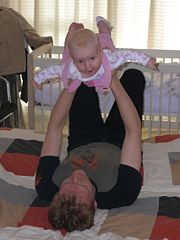(→Role of father in development of the child: missing ref tag error) |
|||
| Line 20: | Line 20: | ||
| − | + | ==Significance for girls== |
|
| − | |||
| − | |||
| − | |||
==Significance for fathers== |
==Significance for fathers== |
||
Revision as of 13:01, 2 January 2012
Assessment |
Biopsychology |
Comparative |
Cognitive |
Developmental |
Language |
Individual differences |
Personality |
Philosophy |
Social |
Methods |
Statistics |
Clinical |
Educational |
Industrial |
Professional items |
World psychology |
Social psychology: Altruism · Attribution · Attitudes · Conformity · Discrimination · Groups · Interpersonal relations · Obedience · Prejudice · Norms · Perception · Index · Outline
Father child relations is the relationship a father has with his child. The quality and content of the relationship can have important implications for the psychological development of the child and for the identity and role of the adult.
Paternal bond

Father and baby
A paternal bond refers to the relationship between a father and his child.[1] In the U.S., legal paternity is presumed for the husband of the mother unless a separate action is taken; an unmarried man may establish paternity by signing a voluntary recognition of paternity or by taking court action.[2] Paternity may also be established between a man and a younger person, commonly in adoption, without the two being biologically related.
The father of a child can develop the bond during the pregnancy of his partner, feeling attachment to the developing child. Research indicates that this may have some biological basis.[3] Statistics show that fathers' levels of testosterone tend to decline several months before the birth of the child. Since high testosterone levels seem to encourage more aggressive behaviour[How to reference and link to summary or text], low levels may enhance the ability to develop a new relationship bond (i.e. with the child).[4]
Fathers find many ways to bond with their children, such as soothing, consoling, feeding (expressed breast milk, infant formula, or baby food), changing diapers, bathing, dressing, playing, and cuddling. Carrying the infant in a sling or backpack or pushing him or her in a baby transport can build the bond, as can participating in the baby's bedtime routine.
Role of father in development of the child
Children who experience significant father involvement tend to exhibit higher scores on assessments of cognitive development, enhanced social skills and fewer behavior problems.[5][6][7] The father is often seen as an authority figure.[8][9][10][11] According to Deleuze, the father authority exercises repression over sexual desire.[12]
Significance for boys
Significance for girls
Significance for fathers
The father-child relationship is the defining factor of the fatherhood role.[13][14] "Fathers who are able to develop into responsible parents are able to engender a number of significant benefits for themselves, their communities, and most importantly, their children."[15]
See also
- Child rearing practices
- Father absence
- Father child communication
- Parental attittudes
- Parental permissiveness
- Parental role
References
- ↑ Early Childhood Longitudinal Study 2006. "Measuring Father Involvement in Young Children's Lives." National Center for Education Statistics. Fathers of U.S. children born in 2001.
- ↑ U.S. Department of Health and Human Services, Administration for Children and Families, Office of Child Support Enforcement. "Handbook on Child Support Enforcement." (Washington, DC: Author) [1]
- ↑ Linda F. Palmer. "Bonding Matters: The Chemistry of Attachment." Attachment Parenting International News: Vol. 5, No. 2, 2002.
- ↑ Douglas Carlton Abrams, "The Making of a Modern Dad." Psychology Today, Mar/Apr 2002.
- ↑ Pruett, K. "Fatherneed: Why father care is as essential as mother care for your child," New York: Free Press, 2000.
- ↑ "The Effects of Father Involvement: A Summary of the Research Evidence," Father Involvement Initiative Ontario Network, Fall 2002 newsletter.
- ↑ Anderson Moore, K. "Family Structure and Child Well-being" Washington, DC: Child Trends, 2003.
- ↑ Osaki, Harumi Killing Oneself, Killing the Father: On Deleuze's Suicide in Comparison with Blanchot's Notion of Death Literature and Theology, doi:10.1093/litthe/frm019
- ↑ [Foucault's response to Freud: sado-masochism and the aestheticization of power http://findarticles.com/p/articles/mi_m2342/is_n3_v29/ai_18096757/pg_4]
- ↑ Eva L. Corredor (Dis)embodiments of the Father in Maghrebian Fiction. The French Review, Vol. 66, No. 2 (Dec., 1992), pp. 295-304
- ↑ Paul Rosefeldt; Peter Lang, 1996. The Absent Father in Modern Drama [CHAPTER 3 - QUESTIONING THE FATHER'S AUTHORITY http://www.questia.com/PM.qst?a=o&d=9916349]
- ↑ Deleuze, Gilles. Coldness and Cruelty. Masochism. Trans. Jean McNeil. New York: Zone, 1989. pp. 63-68.
- ↑ Early Childhood Longitudinal Study 2006. "Measuring Father Involvement in Young Children's Lives." National Center for Education Statistics. Fathers of U.S. children born in 2001.
- ↑ Minnesota Fathers & Families Network. "Do We Count Fathers in Minnesota?" (Saint Paul, MN: Author, 2007). 51.
- ↑ Minnesota Fathers & Families Network. "Fathers to the Forefront: A five-year plan to strengthen Minnesota families." (Saint Paul, MN: Author. 2007).[2]
CategoryFathrs